Book contents
- Frontmatter
- Contents
- List of illustrations
- Acknowledgments
- List of abbreviations
- Glossary
- Introduction: defiled trades
- PART I THE MEANING OF DISHONOR IN EARLY MODERN SOCIETY
- PART II THE DISHONORABLE MILIEU
- PART III PARADOXICAL DISHONOR: PUNISHMENT AND HEALING
- PART IV ARTISANAL HONOR AND URBAN POLITICS
- Conclusion: dishonor and the society of orders
- Selected bibliography
- Index
- CAMBRIDGE STUDIES IN EARLY MODERN HISTORY
Introduction: defiled trades
Published online by Cambridge University Press: 06 August 2009
- Frontmatter
- Contents
- List of illustrations
- Acknowledgments
- List of abbreviations
- Glossary
- Introduction: defiled trades
- PART I THE MEANING OF DISHONOR IN EARLY MODERN SOCIETY
- PART II THE DISHONORABLE MILIEU
- PART III PARADOXICAL DISHONOR: PUNISHMENT AND HEALING
- PART IV ARTISANAL HONOR AND URBAN POLITICS
- Conclusion: dishonor and the society of orders
- Selected bibliography
- Index
- CAMBRIDGE STUDIES IN EARLY MODERN HISTORY
Summary
In the winter of 1654 an unusual wedding took place in the free imperial city of Augsburg. A young fisherman, Andreas Anhauser, married Barbara Leichnam, the daughter of the local skinner. When Andreas had proposed marriage to Barbara in the preceding summer his parents had been aghast at this mismatch. Both Andreas and Barbara came from families that had long resided in Augsburg, but the Anhausers were citizens and prominent members of the fishermen's guild, whereas the Leichnam family had filled the post of urban skinner for three generations. Skinners' work consisted of removing animal carcasses, putting down wild dogs, burying the corpses of suicides in the carrion field, and emptying latrines, among other unsavory tasks. Skinners also assisted the executioner in carrying out a variety of criminal punishments, in particular hangings, the most dishonorable form of execution. The very name of the young bride gave expression to the work her family had performed for generations; her surname Leichnam translates as “corpse.” As skinners, the Leichnam clan belonged to the so-called unehrliche Leute or “dishonorable people,” an outcast group in early modern Germany in which membership was ascribed by birth. The fishermen, by contrast, constituted an ancient and honorable guild. If the young fisherman were to marry into skinners' stock, his wife's dishonor would fall on him, an outrage to both his family and his guild.
The Leichnam family was no less opposed to the marriage, perhaps because they knew the young couple would face social ostracism.
- Type
- Chapter
- Information
- Defiled Trades and Social OutcastsHonor and Ritual Pollution in Early Modern Germany, pp. 1 - 20Publisher: Cambridge University PressPrint publication year: 2000

